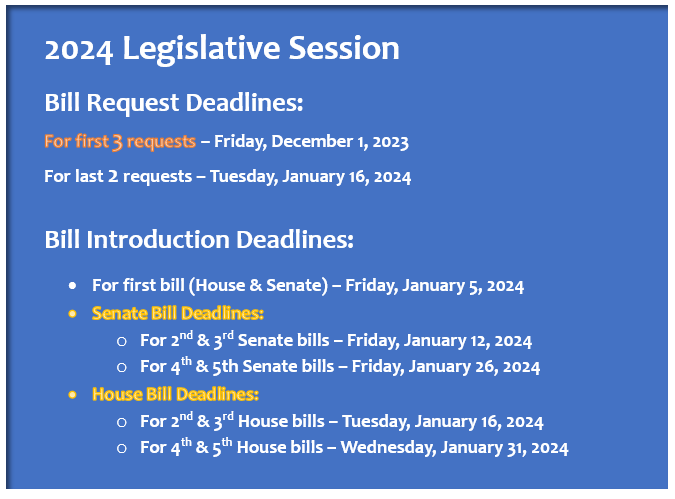by Jery Payne and Patti Dahlberg
It was a great stakeholder meeting. The stakeholders arrived prepared and ready to negotiate. The discussion was respectful, weighing the pros and cons of the policy alternatives. Because the discussion was good and the meeting was ebbing, I looked forward to the legislator and stakeholders settling on a policy. So you can imagine my surprise when the legislator looked over to me and said, “Do you have everything you need to draft this legislation?”
After I cleaned up the coffee, I replied, “Well, I think you have a few decisions to make.”[1]
What Are the Basics?
So what does your drafter need to know to begin drafting your bill? The answer is, “It depends!”
Helpful? Yep, that’s so helpful. If you’re not convinced, here are a few guidelines to help fill in the necessary details:
- What problem are you trying to solve or address?
- Is it a lack of access to a government service? Is someone defrauding the state or businesses? Is it an exploitative business practice? Is it a lack of habitat for wildlife?
- What is the proposed solution?
- Is it a grant program? Is it creating an exemption to a current prohibition? Is it a prohibition of a business practice?
- What are the conditions that make the statute apply?
- Who is eligible for the grant? How do you define the prohibited business practice?
- How does the state know whether these conditions apply?
- If a grant recipient needs to be low income, how will the agency verify the low income status? If a business is prohibited from vertical integration, how will the state identify that the business is vertically integrating? Should the state require a type of business to be licensed? Or should the state authorize law enforcement to investigate complaints?
- What happens when the policy isn’t followed?
- What if a business decides to keep doing the exploitative business practice? Will the state fine the scofflaws? Will the state throw them in jail? Maybe the state will deny them a license? What happens if the grant money isn’t spent appropriately?
- If you are working with stakeholders on the bill, the drafter will need to know who has drafting authority and who is authorized to give and receive information on the bill.
- A promissory note to give the drafter a bottle of the drafter’s favorite beverage if you fail to provide this information… I suppose this isn’t absolutely necessary. … Okay, my editor is telling me to cut it out—I was just kidding anyway.
Now where was I? Oh yeah:
If you don’t have all these details figured out, it’s okay to give the drafter what you do have and then talk with your drafter to work out the rest. By the way, this is one of the reasons why submitting the bill request a bit earlier is a good idea: It gives you time to have these discussions with the drafter.
Other Helpful Information to Tell Your Drafter
In addition to these basic requirements, let your drafter know about any of the following:
- Are there any no-go zones? In other words, should the bill avoid entangling with any other issues?
- Background information is helpful, but your drafter doesn’t need all the political information, such as a list of the organizations who will support the policy or your argument for why it is good policy.
- If your bill is based on an act from another state or if it is based on another Colorado statute, share that with the drafter.
The drafter usually discovers additional decision points while they are drafting the bill. A great example is when your policy conflicts with something in current statutes. Your drafter will contact you to discuss these issues.
Procedural Questions You’ll Need to Answer Before Introduction
Before your bill is introduced, procedural questions need answers, such as:

- Is it okay to release the bill for fiscal note analysis?
- If the bill contains reporting requirements, should they expire in three years?
- Do you prefer a safety clause or a petition clause? The default is a petition clause.
- Do you want your bill to take effect on a specific date?
For more detailed information on these questions and potential answers, see How Would You Like Your Bill? Questions a Bill Sponsor Must Decide.
[1] Although this precise scenario hasn’t happened to me yet, I’ve been in many meetings that aren’t far from this scenario in different ways.


